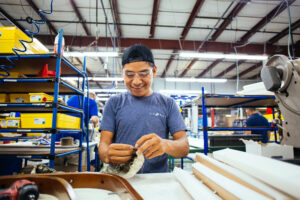Keith Hickerson, Papercut Interactive
Back during the Middle Ages castle towers typically had slit-type openings, windows designed to be narrow on the inside, sometimes with slightly wider flares on the outside walls. The reasons for that design were pragmatic: such a structure allowed for maximum flexibility for defense from within while reducing the risk of a successful attack from without. As a result, castle occupants experienced limits on what they could see of neighbors and the surrounding landscape. In today’s hypercompetitive business environment, we are still sometimes using very narrow windows when we view the outside world.
For example, let’s say you run a residential paving business, and you want to be the best in town. The natural tendency might be to look inside first: Are you serving customers effectively? Is your technology current? What about the effectiveness of your advertising, internet and social media engagement? Do you deliver an exceptional service on time and at a reasonable price, and is the range of your offerings aligned with customer preferences? Next, you might look through “narrow windows” to learn more from local or regional competitors who are in the same business or from best-in-class operators in other markets.
All of those activities make perfect sense as you work to build up your firm. Now let’s look through broader windows. Chances are good that most of the other businesses near you are not in the residential paving business. But there may still be valuable lessons to be learned from the ways they operate, set prices and manage their customer relationships. The residential paving business is an “as needed, where needed” business without high levels of product differentiation and with low frequency of customer engagement. Depending on the scope of work, it may also be a somewhat higher-cost purchase. What other businesses have similar characteristics? Paving has little in common with affordable discretionary businesses, such as coffee shops or movie theaters. While car sales are also “as needed” businesses at one level, there is a buyer fun factor that comes with a new car that is missing from remediation businesses like residential paving, where the goal is to mitigate an issue or satisfy a basic requirement for the property owner.
So where do we look to find reasonable comps for our residential paving business? We need businesses that mitigate a problem; provide a necessity, not “luxury purchases;” have low frequency of customer interaction; and have moderate to higher price points. What could we learn from such businesses as dental offices (clearly need-mitigation services, although the frequency of customer interactions is higher and prices lower)? Tire shops? Plumbers and electrical contractors? Servicers of septic tanks? Chimney sweeps? Heating and air repair services? Roofers? Tree-trimming services? Foundation repair firms?
One of the challenges with low-frequency interaction businesses is that you want to be top-of-mind when a customer identifies a need. You want to be that first call. You also want to help customers identify and react to issues early and, if possible, in a proactive, preventative way.
It is fascinating how few businesses with low-frequency customer interactions make any attempt to stay in touch with former customers. Too many consider each customer relationship as being transactional: one customer = one job. With a friendly call or e-communication indicating it is time for an inspection, more customers might schedule an appointment. The dentist office always wants to schedule your next appointment immediately, or they will call if you take no action on your own. But tree services typically don’t, even if there are many trees in your yard and the service you contracted for originally was only to have a single tree removed. Many septic tank service firms also do no ongoing customer reminders.
Plumbers and electrical contactors also seldom do outreach at the residential level to offer inspection-related, preventative services. Instead, they tend to operate on a “call us when you have a problem, and we will come” model. While that responsiveness is certainly critically important to customers, could there also be a preventative-services overlay to their offering that embeds the firm more deeply (and makes them top of mind more often) with existing customers?
Some heating and air and foundation repair firms are increasingly offering customer membership models that focus on preventative inspections, often leading to a discount on future services if the inspections find areas of concern. What type of ongoing customer connections could our paving business employ along these lines? Should each residential job include a re-inspection service after a certain period of time, offering another automated way to re-engage with existing customers?
Many firms with low-frequency customer interactions also look for adjacent business lines or services they could offer that would deliberately increase the frequency of customer contact. What other businesses could our residential paving company explore that would be complementary to the company’s capabilities and get them in front of customers repeatedly? Would stone masonry work, patio work or other services make sense, or could there be viable partnerships for cross-referrals with other businesses who provide those services?
What significant advantages does our paving company have that many other low-frequency customer interaction businesses do not have? Much like the roofing, house painting or landscaping businesses, a fairly quick visual inspection demonstrates the need for the service. How could our imaginary paving business exploit that advantage? What about employing college students part-time as visual scouts, teaching them what to look for and initially identifying potential prospects for outreach by the firm’s sales team?
Another advantage for this type of firm is that it is, by definition, a physical service, one of the businesses in this day and time that is not likely to be disrupted by Amazon or other online providers. That makes it a “winner-take-most” locally focused business: more market share creates a virtuous cycle of customer awareness and recommendations that allow a dominant provider to flourish and maintain higher margins. As a result, you should be looking at ways to increase market share meaningfully in the near term, viewing that work as an investment in the future financial dynamics of the business.
Looking through broader windows to see what we can learn from other businesses always starts with thinking hard about what sort of business we are in: what are the customer expectations and the customer-interaction dynamics that drive our success? Then we look for other types of firms – frequently in very different lines of work – to see how they are dealing with their own challenges and what we can learn from their business models.
Let’s make this the month we commit to stepping outside our business castles with their too-narrow windows and check out the neighbors. Regardless of what line of work we are in, what we learn might just give us some fresh ideas for ways to grow our own businesses, our profits and our engagement with every customer we serve.
If you’d like to get a cup of coffee and chat with the Papercut Interactive team about what your business might be able to learn from other firms and their business models, just give us a call. We’re all about conversations and coffee.







